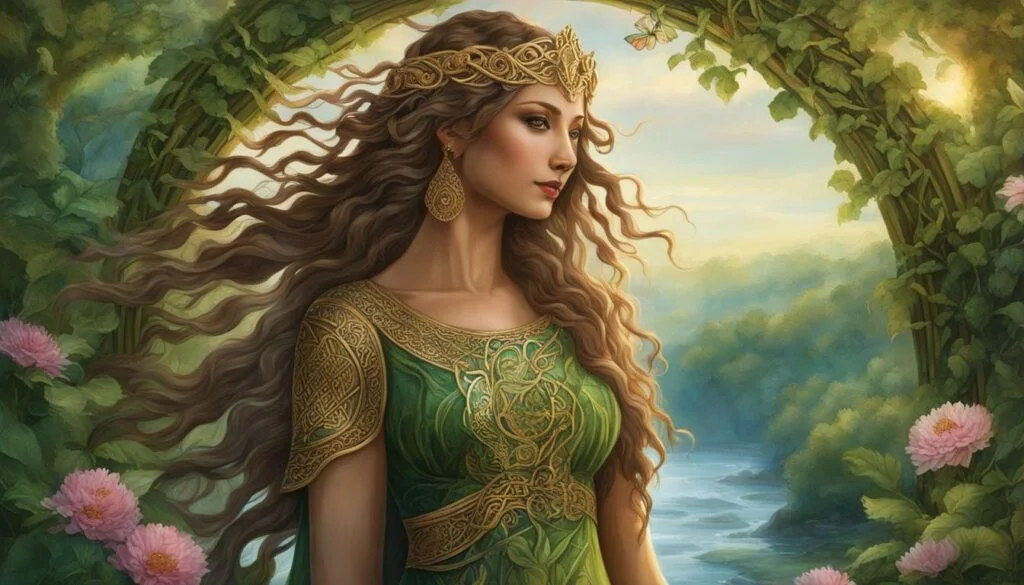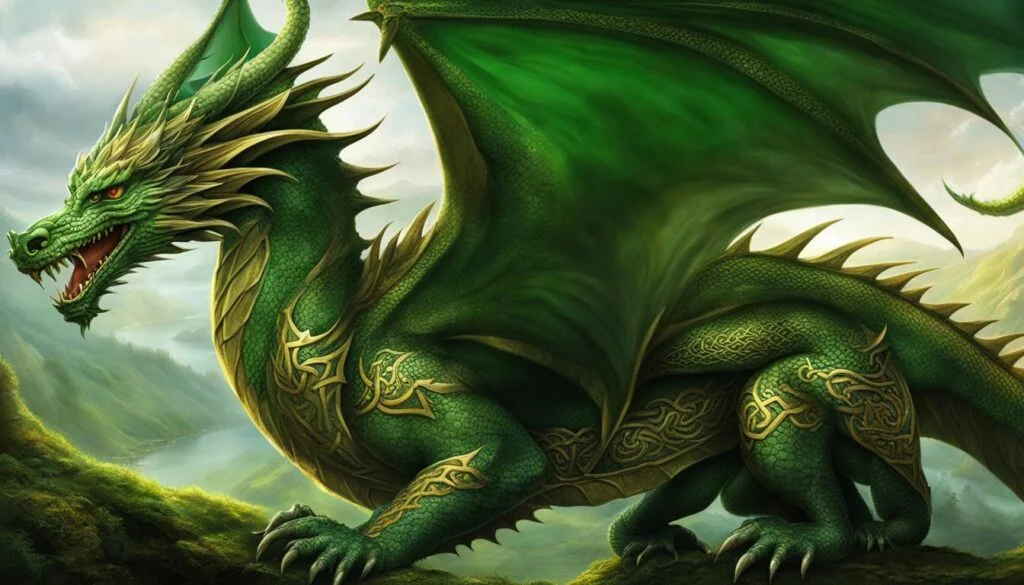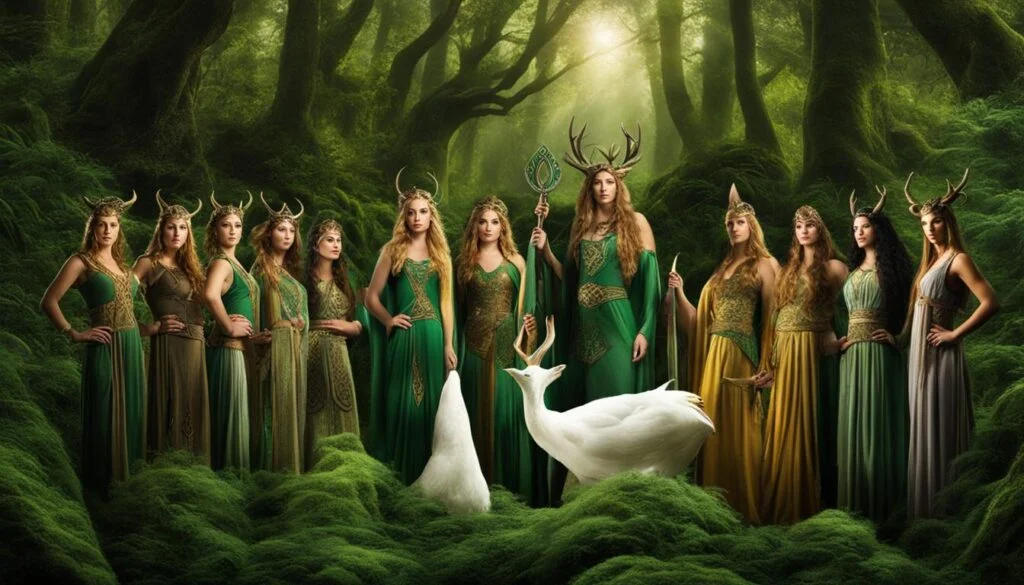Who is Danu in Celtic mythology? Known as the Celtic goddess Danu, she is a significant figure in the ancient myths of Ireland. Revered as the mother of the Irish gods, Danu embodies the nurturing forces of the earth and is associated with fertility, abundance, and wisdom.
In Irish folklore, Danu is closely connected to the Tuatha Dé Danann, a divine race descended from Nemed who were exiled from Ireland. As their ancestral mother, she provided guidance and magical skills, shaping the destiny of the Tuatha Dé Danann.
Throughout Celtic culture, Danu holds great significance as a mother goddess. Worshipped and celebrated, she symbolizes the divine feminine energy and is revered for her ability to bring forth life and nurture the community.
With her timeless appeal, Danu continues to inspire modern society through art, music, and literature. Artists across various mediums find inspiration in her mystical qualities and create works that capture her essence.
Key Takeaways:
- Danu is the mother of the Irish gods and represents the nurturing forces of the earth.
- She is closely associated with the Tuatha Dé Danann, a divine race in Irish mythology.
- Danu holds great significance as a mother goddess in Celtic culture.
- Her influence extends to modern society, inspiring various forms of artistic expression.
- Artists find inspiration in her mystical qualities and continue to create works that capture her essence.
The Mythology of Danu
Danu is a prominent figure in Celtic mythology, revered as the divine maternal figure. She is often referred to as the mother of the gods or the mother of all things. Associated with abundance, prosperity, and the creation of the world, legends of Danu in Celtic mythology depict her as a powerful and nurturing goddess.
While specific stories about Danu are limited, her various names and roles reflect her significance in Celtic culture. She is believed to have emerged as one of the primary deities in Celtic mythology, embodying the essence of creation and motherhood. Danu’s portrayal as the creator goddess in Celtic mythology reinforces her divine status and the reverence with which she is regarded.
Though the specifics of Danu’s myths may vary, her importance is undeniable. The legends and stories surrounding her serve to highlight her role as a central and powerful figure in Celtic mythological traditions. She is considered a nurturing force and protector, embodying the eternal cycle of life and death.
Despite the limited written records, Danu’s influence and significance have endured for centuries. As the embodiment of the divine feminine and the creative force of the universe, she represents the enduring power of nature and the interconnectedness of all things.
Danu in Celtic Culture
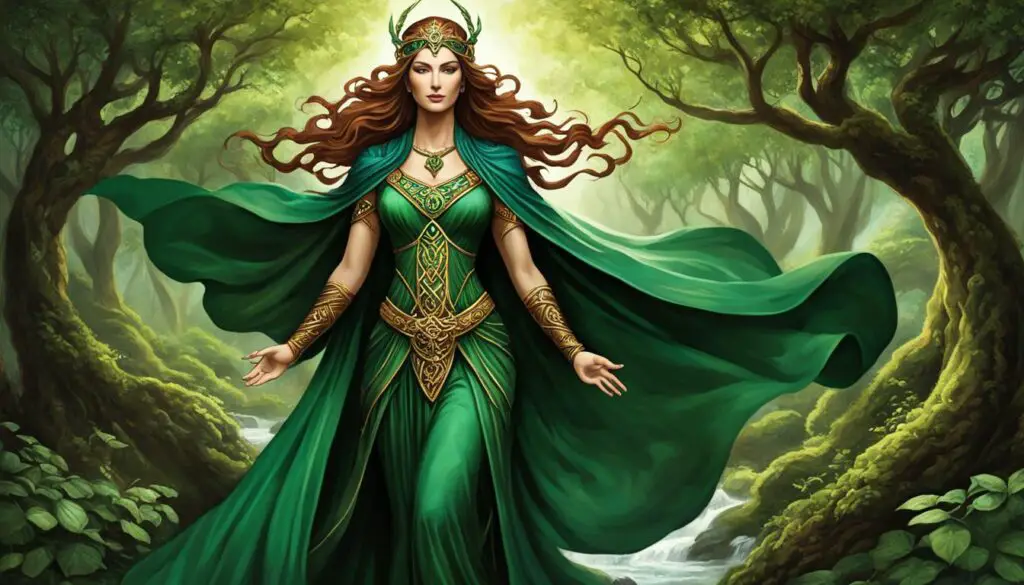
Danu holds immense significance in Celtic culture, particularly as a revered mother goddess. She embodies key aspects such as fertility, wisdom, and the life-giving forces of the wind. The Celts worshipped and revered Danu for her nurturing nature and divine feminine energy. She played a crucial role in the origins of the Celts, ensuring the well-being of the community and sustaining life.
In Celtic society, rituals and worship dedicated to Danu were conducted to seek her blessings for fertile lands, abundant crops, and healthy offspring. Celebrating Danu reinforced the deep connection between humanity and the nurturing forces of nature within Celtic culture.
Danu’s presence as a mother goddess in Celtic culture highlights her role as a powerful and respected figure. The divine feminine energy represented by Danu was integral to the spiritual and social fabric of the Celtic people. She imbued their lives with fertility, wisdom, and harmony, ensuring the prosperity and continuity of their communities.
Origins of the Celts and Danu’s Influence
Danu’s association with the origins of the Celts further underscores her importance in Celtic culture. She played a vital role in shaping the destiny and identity of the Celtic people, providing them with a sense of unity and purpose.
Her nurturing nature and wisdom were instrumental in guiding the Celts as they navigated the challenges of their time. Danu’s influence extended beyond individual lives – she influenced the entire community, ensuring their well-being and prosperity.
The Divine Feminine Energies in Celtic Tradition
Danu’s representation as a mother goddess in Celtic tradition also highlights the reverence given to the divine feminine energies. The Celts recognized and respected the nurturing, life-giving qualities of women, which aligned with their deep connection to the land and the cycles of nature.
Through Danu, the Celtic people celebrated and revered the vital role of women in society, acknowledging their wisdom, intuition, and innate connection to the earth. The divine feminine energy embodied by Danu played a significant role in Celtic spirituality, fostering balance, harmony, and the interconnectedness of all living beings.
Danu in Irish Folklore and Literature
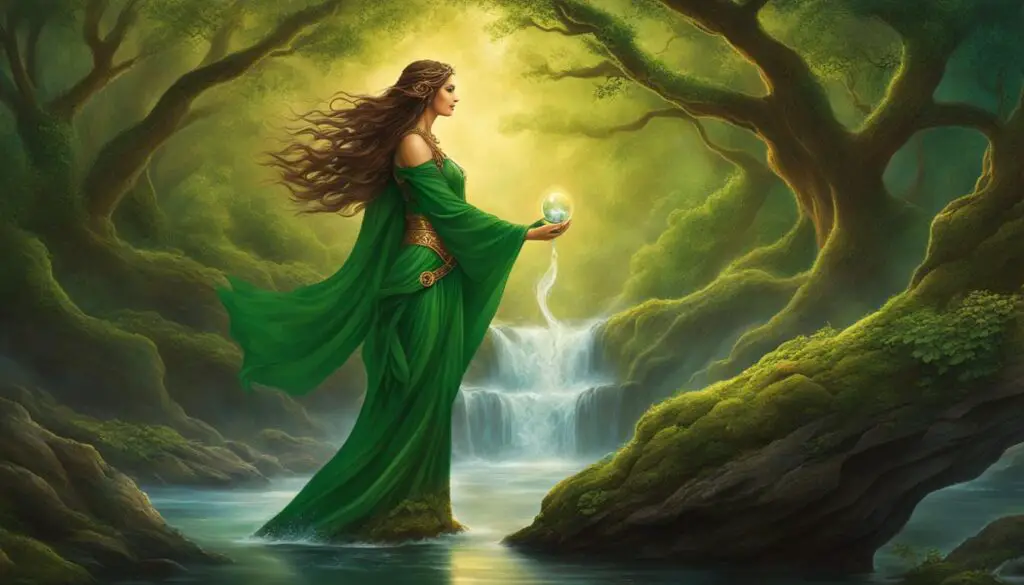
In Irish folklore and literature, Danu holds a prominent place as a revered figure. She is closely associated with the Tuatha Dé Danann, a divine race in Irish mythology. The Tuatha Dé Danann are considered the divine rulers of Ireland and possess magical powers and wisdom. Stories depict Danu as their ancestral mother, nurturing them and guiding their destiny. While specific details can vary, Danu’s importance in Irish mythology cannot be understated. She represents the divine feminine energy and the ancestral lineage of the Tuatha Dé Danann.
Throughout Irish folklore and literature, Danu’s presence resonates strongly, symbolizing the power and strength of the divine feminine. Often depicted as the ancestral mother of the Tuatha Dé Danann, she is revered for her nurturing and guiding nature. Danu’s role in Irish mythology encapsulates the essence of the Tuatha Dé Danann, their magical abilities, and their connection to the land. Her influence and significance in Irish folklore continue to captivate readers and inspire a sense of wonder and reverence for the mystical world of Irish mythology.
Danu in Comparison with Other Goddesses
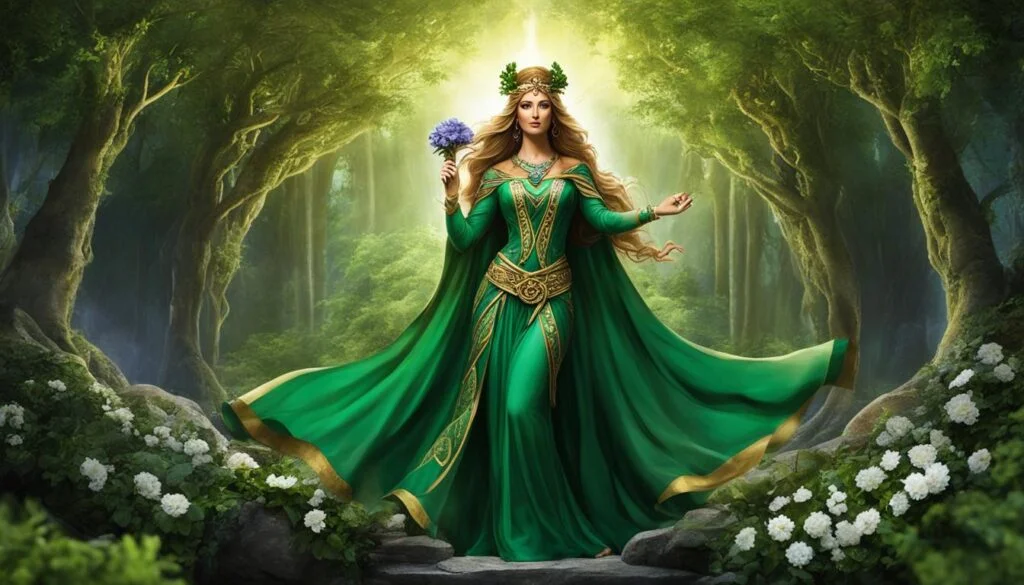
When comparing Danu, the Celtic goddess, with goddesses from Greek and Norse mythologies, we can observe certain similarities and differences. While Danu shares common attributes with Greek goddesses such as Aphrodite, Athena, and Demeter, as well as Norse goddesses Frigg, Freya, and Idun, it is important to note the distinct roles and associations of each goddess.
Danu, as a mother goddess, embodies the nurturing and life-giving aspects found in both Greek and Norse mythologies. Her connection to nature and the cycles of fertility mirrors the roles of goddesses like Demeter and Freya. Furthermore, Danu’s qualities as a wise figure align with the wisdom attributed to Athena and Frigg.
However, Danu sets herself apart with her unmistakable Celtic essence. Being deeply rooted in Celtic mythology and culture, she represents the unique beliefs and practices of the Celtic people. Her presence as a divine maternal figure, the embodiment of the earth’s fertility, and her association with the wind sets her apart from other deities in Greek and Norse mythologies.
The Significance of Danu in Modern Society
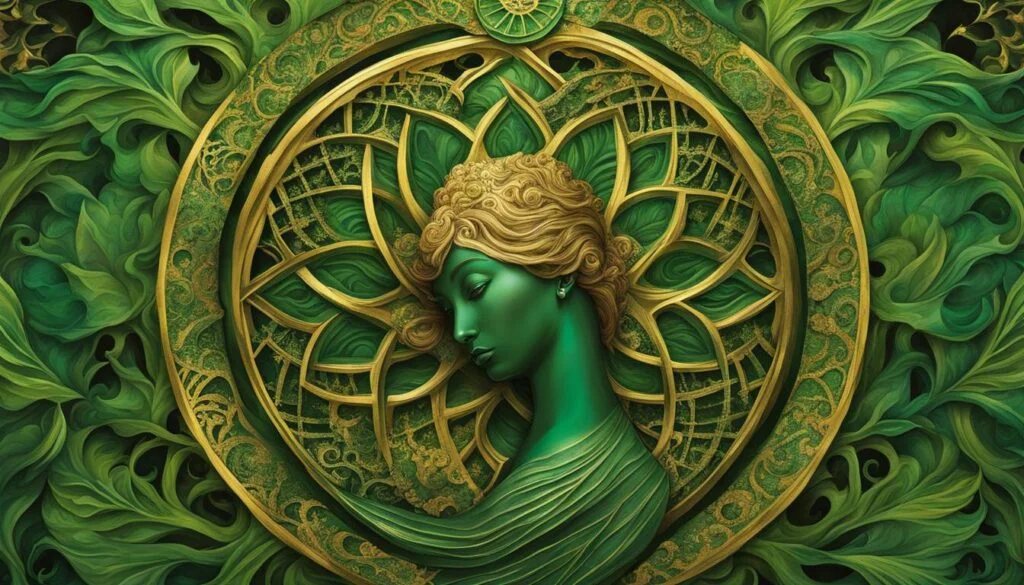
The ancient Celtic goddess Danu continues to have a profound influence on various forms of artistic expression in modern society. Artists from diverse mediums draw inspiration from the mystical and motherly qualities associated with Danu, infusing their creations with her timeless appeal.
Influence in Art
Danu’s connection to fertility, wisdom, and the elements serves as a rich source of inspiration for painters, sculptors, and other visual artists. Her depiction in art often reflects her nurturing and powerful nature, capturing her role as the mother goddess. Artists channel Danu’s energy and symbolism to create visually stunning pieces that evoke a sense of awe and reverence.
Art featuring Danu can be found in galleries, museums, and exhibitions worldwide, captivating audiences with its enchanting portrayal of this ancient deity. Through these artistic expressions, Danu’s influence persists, transcending time and reminding us of the enduring power of Celtic mythology.
Influence in Music
The influence of Danu is also felt in the realm of music. Musicians and composers are inspired by her mythological significance, infusing melodies and lyrics with the essence of her divine presence. Whether it’s through ethereal melodies or powerful symphonies, Danu’s influence can be heard in various genres, from folk and Celtic music to contemporary compositions.
Her association with fertility and abundance often finds expression in celebratory songs and lively tunes that celebrate the cycles of life and nature. Danu’s influence in music helps keep Celtic traditions alive and resonates with listeners who are drawn to the enchanting allure of her mythological legacy.
Influence in Literature
Writers and authors incorporate Danu’s symbolism and character into their literary works, weaving her stories into narratives that captivate readers. Her embodiment of wisdom, fertility, and the divine feminine energy inspires themes of growth, transformation, and the intricacies of human nature.
Danu’s presence in literature serves as a reminder of our connection to nature and the profound wisdom it holds. From epic fantasy novels to poetic verses, her influence adds depth and richness to literary works, offering readers a glimpse into the mythical realms of Celtic culture.
Through art, music, and literature, the influence of Danu endures, captivating and inspiring modern society. Her mystical qualities and connection to fertility, wisdom, and the elements continue to resonate with artists across different mediums. As we explore and appreciate the artistic expressions influenced by Danu, we gain a deeper understanding of the rich tapestry of Celtic mythology and its enduring impact on our world.
Conclusion
Danu, the prominent earth goddess of Celtic mythology, holds a significant place in Celtic culture. Revered as the mother of the Irish gods, Danu is deeply associated with fertility, wisdom, and the life-giving forces of the wind. Her multifaceted character as a nurturing mother, wise teacher, and warrior goddess showcases the depth of her power and complexity. Through art, music, and literature, Danu continues to inspire and resonate with contemporary society, her influence extending far beyond ancient times.
Danu’s significance in Celtic culture is undeniable. Her portrayal as a symbol of motherhood, wisdom, and the sacred feminine continues to captivate and provide guidance to those who connect with Celtic heritage. From her role as the mother of the gods to her association with the origins of the Celts, Danu’s presence in ancient texts and folklore reinforces the deep cultural connection between humanity and the nurturing forces of nature.
Whether through rituals, festivals, or artistic expressions, Danu remains a cherished figure in Celtic mythology. Her timeless appeal serves as a reminder of the important values and qualities that Celtic culture holds dear. Danu’s legacy stands as a testament to the enduring power of ancient myths and their ability to enrich and inspire our modern lives.
FAQ
Who is Danu in Celtic mythology?
Danu is the most ancient of the Celtic gods and is referred to as the mother of the Irish gods. She represents the earth and its fruitfulness, and is associated with fertility and abundance.
What is the significance of Danu in Celtic culture?
Danu holds a significant role in Celtic culture as a mother goddess. She represents fertility, wisdom, and the life-giving forces of the wind. In Celtic society, Danu was worshipped and revered for her nurturing nature and divine feminine energy.
What role does Danu play in Irish folklore and literature?
In Irish folklore and literature, Danu holds a prominent place as a revered figure. She is closely associated with the Tuatha Dé Danann, a divine race in Irish mythology. Stories depict Danu as their ancestral mother, nurturing them and guiding their destiny.
How does Danu compare to other goddesses in different mythologies?
When comparing Danu with goddesses from Greek and Norse mythologies, certain similarities and differences can be observed. Danu shares common attributes with Greek goddesses such as Aphrodite, Athena, and Demeter, as well as Norse goddesses Frigg, Freya, and Idun.
How does Danu continue to influence modern society?
The ancient Celtic goddess Danu continues to inspire and influence various forms of artistic expression in modern society. Artists across different mediums find inspiration in the mystical and motherly qualities associated with Danu. Her connection to fertility, wisdom, and the elements serves as a rich source of inspiration for painters, sculptors, musicians, and writers.


